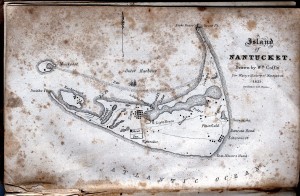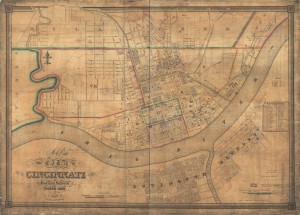Nantucket to Cincinnati
I have often wondered about the Coffin family’s migration from Nantucket to Cincinnati. I am still piecing together the history and the possibilities but this is how it seems to me to have happened.
Until very recently, I have never found specific information about my Coffin family leaving Nantucket, except that I knew they did at some point. Based on the births and deaths of children of Cyrus and Abigail Coffin, my great-great grandparents, that family migrated between April 1813 when a son Zebulon was born in Nantucket and August 1814 when that son died in Cincinnati. I recently came across a brief background of his live and travels, a typed manuscript, written by C. Louis Coffin in about 1966. In this he described his great-great-grandmother’s having “escaped from Nantucket in 1813 and came to Cincinnati with her 31 year old son Cyrus”. This was Sarah Folger Coffin, widow of Isaiah Coffin, my great-great-great grandparents. So for the present I am assuming that the Coffins left Nantucket after April 1813 and before the end of that year. The family grouping most likely included Sally and her two youngest children, Cyrus, his wife Abigail, and their 5 youngsters. It appears that at least 3 of Cyrus’s other brothers also came to Cincinnati but it is not clear whether they all came at the same time. Other Nantucket family names also appear in early Cincinnati records and there may have been a number of groups that migrated west.
Isaiah Coffin, husband of Sarah or Sally as she was known, died in April 1813 in Nantucket. So far I have not found any record or note of why he died, at the relatively young age of 55. He did reportedly leave a will, which I have not found yet. Sally was left with 2 young children still at home: a daughter, Eliza, was not quite 12 and a son, Christopher was just 7 years old. There were also 2 married sons and 3 grown sons who were not yet married. My great-great-grandfather, Cyrus was their oldest son. He was married and had 5 young children of his own, the youngest of whom (Zebulon) was born 2 days after the death of Isaiah. I do not know whether the family had already made plans to migrate or whether Isaiah’s death was an important factor.
From a historical perspective, the War of 1812 was causing significant problems for Nantucket and its inhabitants. As noted by Obed Macy in 1835: by 1811 many of the inhabitants of Nantucket began to think of removing themselves to “the country” as it seemed more likely that war would take place. There were growing concerns about the value of real estate. “The thoughts of those who proposed to remove were, in general, turned towards Ohio, attracted by the flattering accounts received from that state of the salubrity of its climate and the luxuriance of its soil.” Nantucket’s soil by that point did not support growing enough crops to support the population of the island. So this may partially explain why the Coffins headed to Ohio and Cincinnati.
Nantucket is an island about 30 miles south of Massachusetts, which was an even more significant distance to cross in the early 1800s than it is today. By the time war was declared by the United States against England, Nantucket was already feeling the effects of the conflict. It was increasingly difficult to import the food and other necessary items to the island. English ships prevented most incoming and outgoing contact with the continent. The whaling ships, Nantucket’s primary source of income and where most of the inhabitants’ money was invested, were mostly at sea when the war was declared and many were captured by the English. Many American sailors were impressed into the service of the English. As R.A. Douglas-Lithgow wrote: “The miseries and deprivations of the Revolution were repeated; the same struggle for existence was maintained against the same terrible odds.”
“It is not the purpose of the writer, nor is it feasible, to chronicle in detail either the privations and sufferings of the islanders during this terrible war, or the spirited efforts they made to mitigate its evils by fervent appeals to both the American and the British authorities. Their ships at sea, which represented their most valuable possessions, were in imminent danger, all business was at a standstill, many of the families were reduced almost to beggary and starvation, and the condition of the involuntarily unemployed was, indeed, desperate.”
So it appears that there was a very difficult life facing the Coffins on Nantucket when they left. There were few jobs and there was little money among the inhabitants to purchase goods or services even when they were available. Moving to “the country” and going west might have seemed like a pretty good idea, and likely to provide a life with more potential than they were leaving.
- Douglas-Lithgow, R.A. Nantucket A History. New York: G.P. Putnam’s Sons, 1914. [Read online at Google Books.]
- Macy, Obed. A history of Nantucket. Boston: Hilliard, Gray, and Co., 1835. [Book from the author’s private library. The image of the Nantucket map was scanned by the author for this posting.]
- Cincinnati 1838 image from the Library of Congress, American Memory, Digital ID g4084c ct001308 http://hdl.loc.gov/loc.gmd/g4084c.ct001308

Leave a Reply